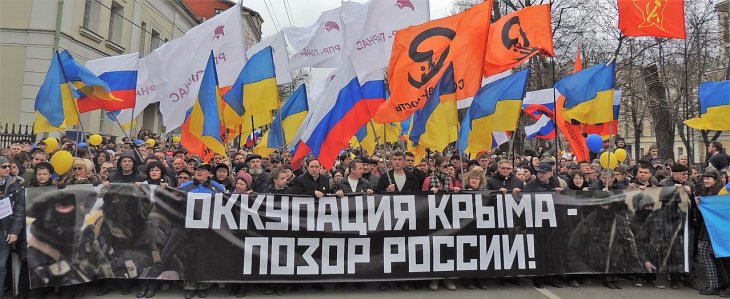The crisis in Ukraine reveals some distinct opinions about how the world is viewed. Most accurately, people see Russia as distinct from Ukraine, in which case what is taking place would be best evaluated as interstate war. Putin and his supporters, however, seem to see things in a different way.
On the one hand, they seem to view Ukraine as a distinct part of Russia, in which case what is taking place would be best evaluated as state repression. Here, a part of the “real” nation has acted in a threatening manner and the “true” political authority is attempting to put down and re-establish dominance.
On the other hand, clearly contradicting the position above, Putin and his supporters have occasionally yielded that Ukraine is a separate nation but noted that they are engaging in behavior that threatens Russians in their midst: genocide.

“We will need to see how much repression will be used against the behavioral challengers in Russia”. Slogan from Moscow in 2014: “Occupation of the Crimea is a shame of Russia”. Wikimedia Commons
Norms against invading other countries are strong and longstanding, so there is perhaps no other justification for moving into another nation than to save its occupants from large-scale, violent, state-sponsored repression.
Indeed, people looking for someone to compare Putin and Russia to in recent history should look to Paul Kagame and the Rwandan Patriotic Front (RPF). Against the now sacred territorial norm of non-intervention, the RPF, then based in Uganda, decided to invade Rwanda where, they maintained, their ethnic kin were in mortal danger (which many doubted prior to the invasion). Not only did the RPF invade Rwanda, they also maintained an illegal presence in the Democratic Republic of the Congo (DRC) for years (consider this, this as well as this) and engaged in diverse activities in South Africa as well as other countries — albeit nothing comparable to what they did in the DRC.
The frames and solutions that emerge are very distinct in other ways as well. If what is happening in Ukraine is state repression, then standard solutions offered in the context of interstate war — sanctions, threats, and naming/shaming — will not work. In line with my forthcoming book with Ben Appel —The Death and Life of State Repression — the Russian regime will simply need to be changed in some way in order for the state-sponsored violence to stop.
In our book, we argue that repressive behavior—especially of a large-scale, violent nature — is a very sticky process that is largely slow-moving and non-adaptive. Consequently, changing this behavior is rare unless the ruling cohort is perturbed in some manner.
But what is capable of unsettling a repressive regime? In The Death and Life of State Repression, we show that political democratization plays a crucial role in reducing and stopping most aspects of repressive spells and that democratization itself is influenced by non-violent direction action. Will the anti-war protests occurring throughout Russia and the tide of civil society defections help to quell Russian state violence in Ukraine? This is unclear. Many wish for such an outcome but are pessimistic that protests in Russia will make a difference.
There is also something to be said about which aspect of repression one is trying to stop. Is Ukraine the onset of a repressive spell — the beginning? It is an escalation of prior activity? Is it a recurrence? Stopping Russian repression in Ukraine will probably require different approaches, depending on where one is in the Death/Life cycle of repressive activity.
Clearly, things are still unfolding. For example, we will need to see how much repression will be used against the behavioral challengers in Russia. Here, a recent piece by myself, Babak RezaeeDaryakenari and Reed Wood in the Journal of Global Security Studies, Tenure Through Tyranny? Repression, Dissent and Leader Removal in Africa and Latin America, 1990-2006, might also prove instructive.
For example, we find that if the Putin regime over-produces its use of coercion and force in the face of a behavioral challenge — that is, if they tamp down too tightly and brutally on dissent by imprisoning or murdering challengers — then the likely outcome is revolution, as individuals within the society become outraged at what is seen as an overreach. If, however, the Putin regime underproduces their use of coercion and force in the face of a behavioral challenge, then the likely outcome is a coup.
There is much that we do not know about the current context in Russia and Ukraine. Most do not know the situation regarding the Russian military and their history of covert and interpersonal support for the existing regime. It is also unclear who might lead any coup-like effort.
Similarly, it is not clear how robust the resistance effort might be within Russian civil society, although examples are seemingly popping up all over the nation. What my research with Appel, RezaeeDaryakenari, and Wood lead us to focus on however is the relative balance of state-sponsored repression compared to those who are behaviorally challenging the existing authorities.
This balance will be crucial for what happens next. Most scholars, policymakers, and journalists do not explicitly discuss such things — favoring a discussion of one side or the other. Taking such a position though will only hinder our ability to understand what is happening as well as what we might need to do next.
The author
Christian Davenport is Walgreen Professor for the Study of Human Understanding and Professor of Political Science, University of Michigan; Research Professor, Peace Research Institute Oslo (PRIO); and Fellow, American Academy of Arts & Sciences (AAAS).
- This text was first published 3 March 2022 by Political Violence at a Glance